2025新人教版七年级英语下册units 5~6 教材知识期末复习课件
文档属性
| 名称 | 2025新人教版七年级英语下册units 5~6 教材知识期末复习课件 |  | |
| 格式 | pptx | ||
| 文件大小 | 3.1MB | ||
| 资源类型 | 试卷 | ||
| 版本资源 | 人教版 | ||
| 科目 | 英语 | ||
| 更新时间 | 2025-05-30 07:26:13 | ||
图片预览

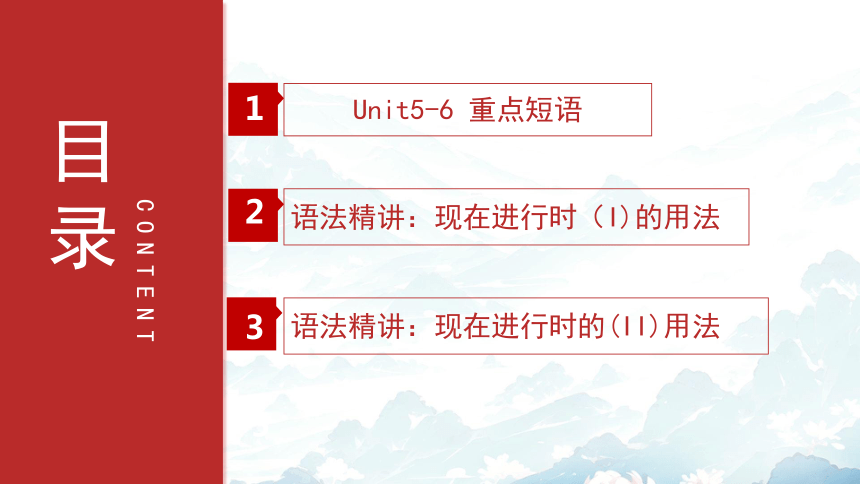
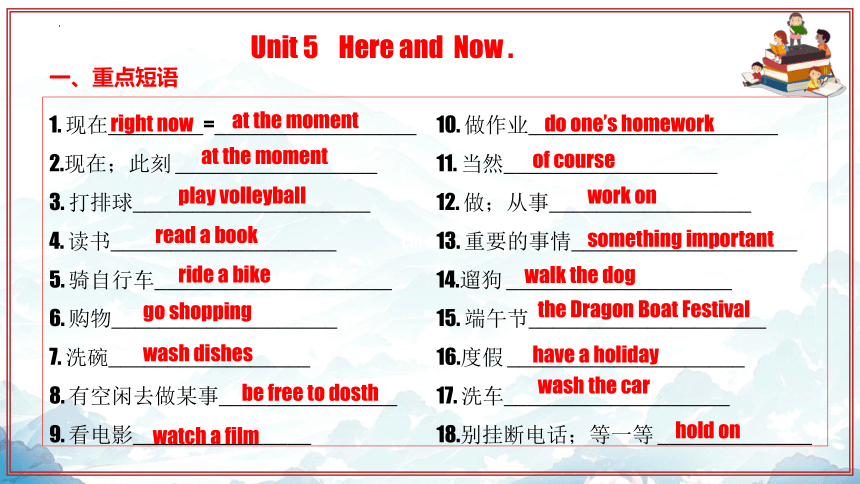
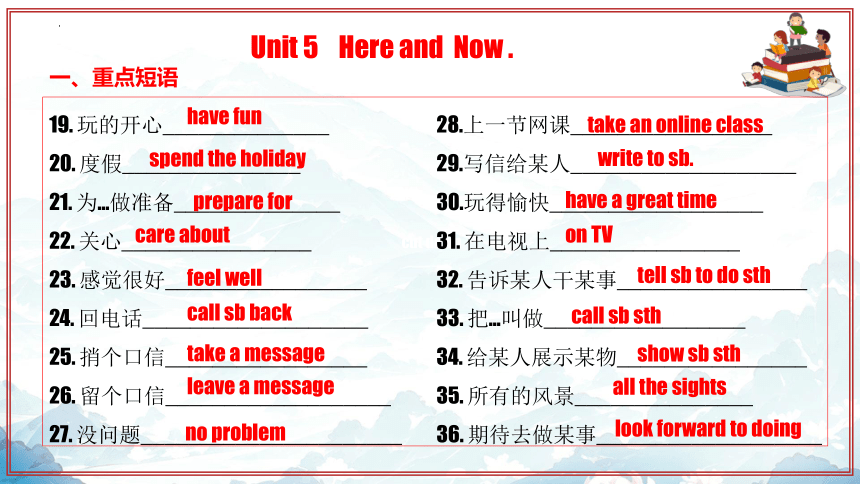
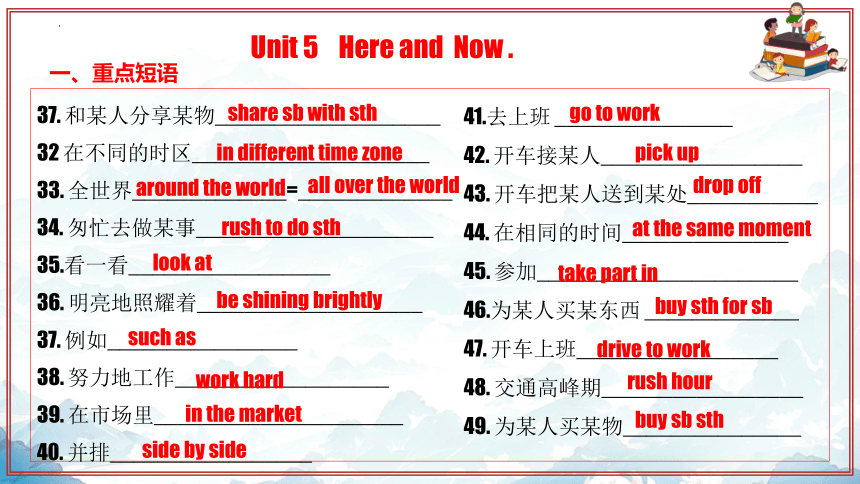
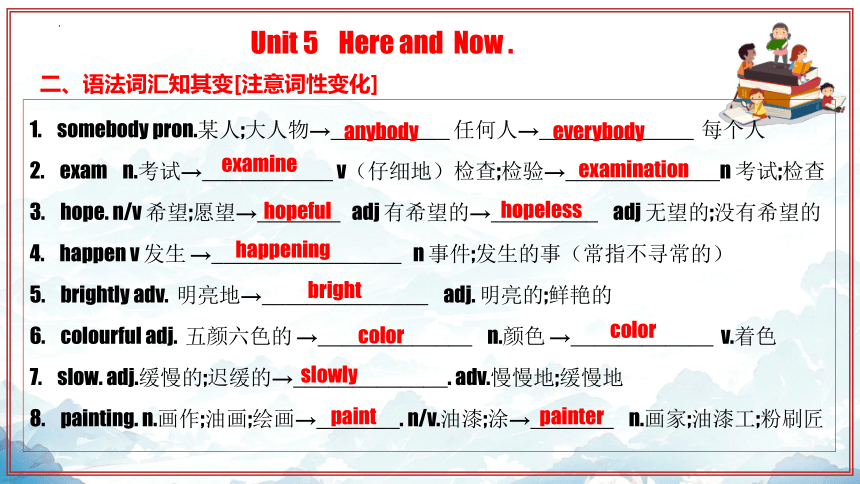
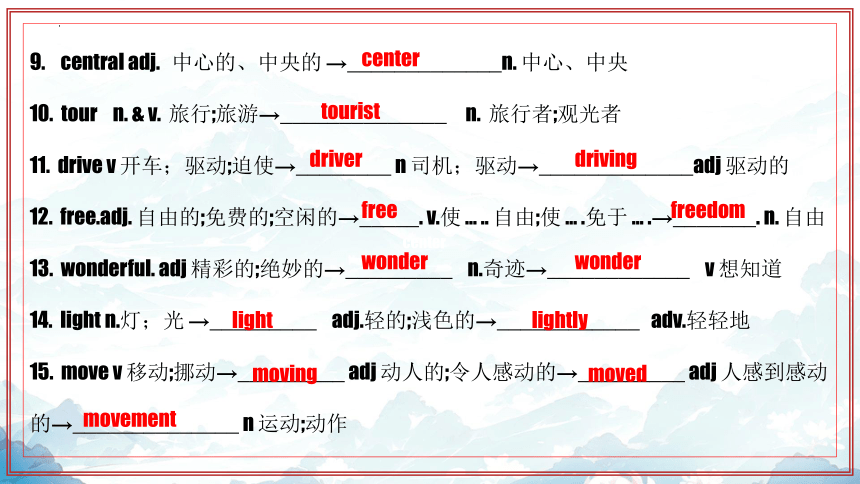
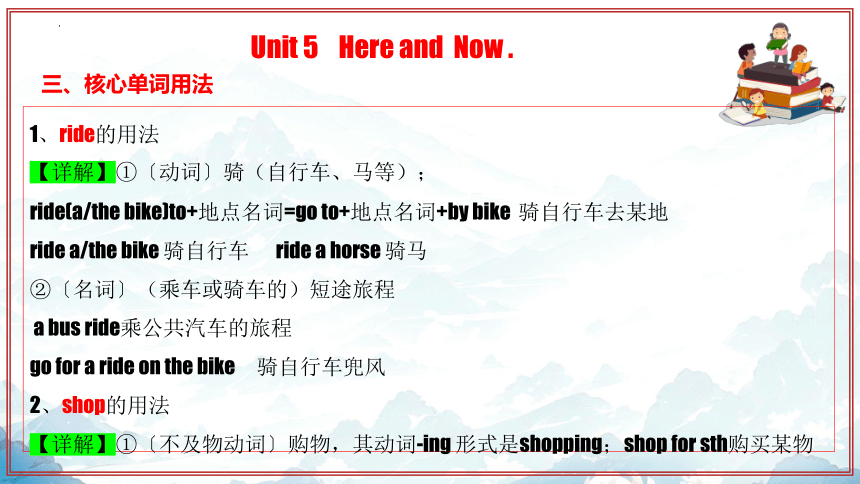
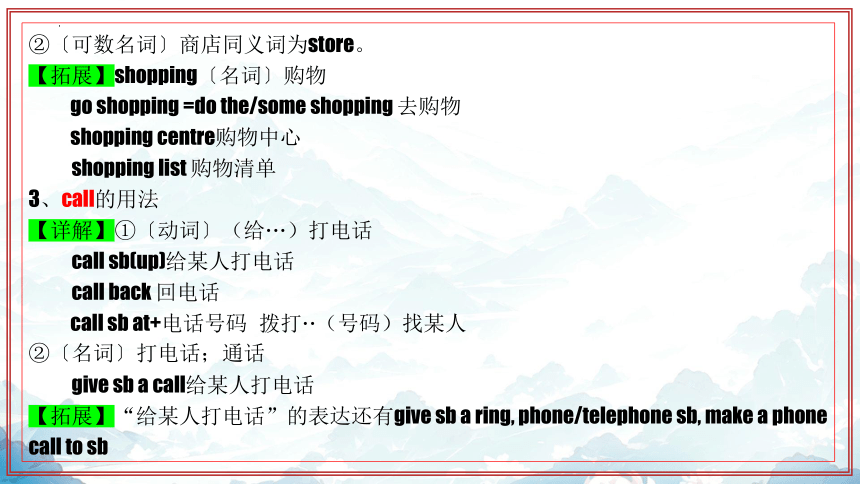
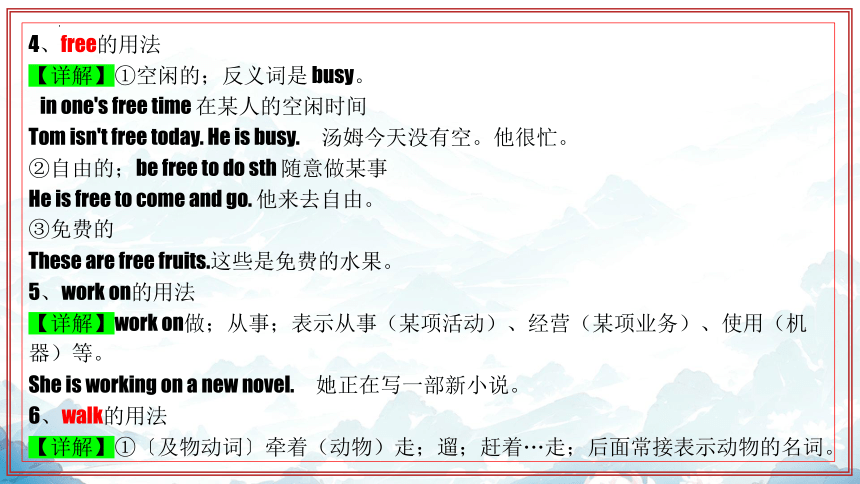
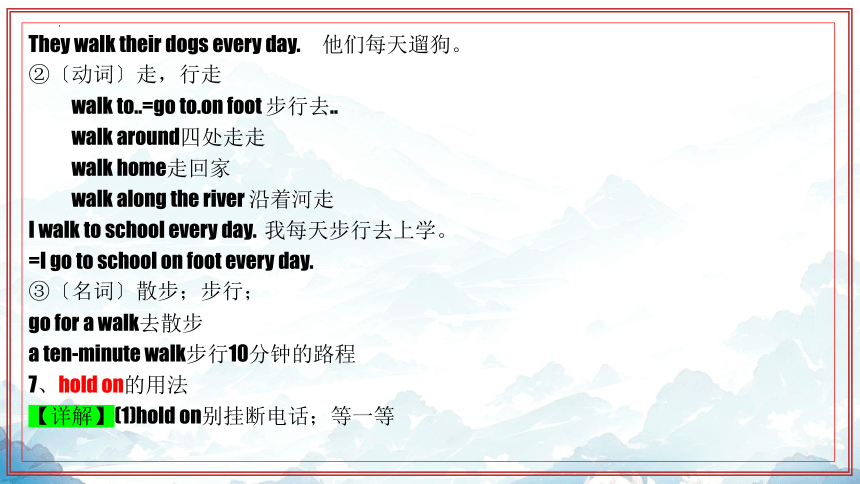
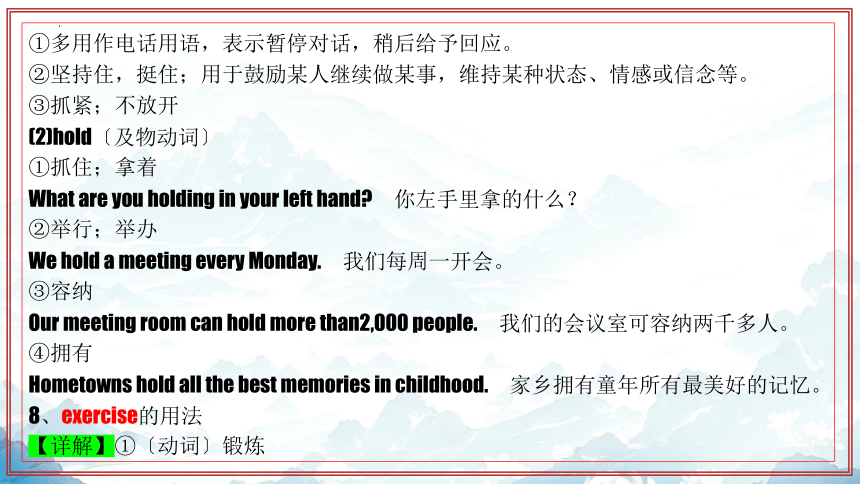
文档简介
(共55张PPT)
人教版七年级下册期末
Unit5-Unit6教材知识复习
目
录
CONTENT
Unit5-6 重点短语
语法精讲:现在进行时(I)的用法
2
1
5
语法精讲:现在进行时的(II)用法
3
cut down
Unit 5 Here and Now .
一、重点短语
1. 现在________=_________________
2.现在;此刻 _________________
3. 打排球____________________
4. 读书___________________
5. 骑自行车____________________
6. 购物___________________
7. 洗碗_________________
8. 有空闲去做某事_______________
9. 看电影_______________
10. 做作业_____________________
11. 当然__________________
12. 做;从事_________________
13. 重要的事情___________________
14.遛狗 ___________________
15. 端午节____________________
16.度假 ____________________
17. 洗车___________________
18.别挂断电话;等一等 _____________
do one’s homework
of course
work on
something important
walk the dog
the Dragon Boat Festival
have a holiday
wash the car
hold on
right now
at the moment
at the moment
play volleyball
read a book
ride a bike
go shopping
wash dishes
be free to dosth
watch a film
cut down
一、重点短语
19. 玩的开心______________
20. 度假_______________
21. 为…做准备______________
22. 关心________________
23. 感觉很好_________________
24. 回电话___________________
25. 捎个口信_________________
26. 留个口信___________________
27. 没问题______________________
28.上一节网课_________________
29.写信给某人___________________
30.玩得愉快__________________
31. 在电视上________________
32. 告诉某人干某事________________
33. 把…叫做_________________
34. 给某人展示某物________________
35. 所有的风景_______________
36. 期待去做某事___________________
Unit 5 Here and Now .
have fun
spend the holiday
prepare for
care about
feel well
call sb back
take a message
leave a message
no problem
take an online class
write to sb.
have a great time
on TV
tell sb to do sth
call sb sth
show sb sth
all the sights
look forward to doing
一、重点短语
37. 和某人分享某物___________________
32 在不同的时区____________________
33. 全世界_____________=_____________
34. 匆忙去做某事____________________
35.看一看_________________
36. 明亮地照耀着___________________
37. 例如________________
38. 努力地工作__________________
39. 在市场里_____________________
40. 并排_________________
Unit 5 Here and Now .
41.去上班 _______________
42. 开车接某人_________________
43. 开车把某人送到某处___________
44. 在相同的时间______________
45. 参加______________________
46.为某人买某东西 _____________
47. 开车上班_________________
48. 交通高峰期_________________
49. 为某人买某物_______________
share sb with sth
in different time zone
around the world
all over the world
rush to do sth
look at
be shining brightly
such as
work hard
in the market
side by side
go to work
pick up
drop off
at the same moment
take part in
buy sth for sb
drive to work
rush hour
buy sb sth
二、语法词汇知其变[注意词性变化]
1. somebody pron.某人;大人物→__________ 任何人→_____________ 每个人
2. exam n.考试→___________ v(仔细地)检查;检验→_____________n 考试;检查
3. hope. n/v 希望;愿望→_______ adj 有希望的→_________ adj 无望的;没有希望的
4. happen v 发生 →________________ n 事件;发生的事(常指不寻常的)
5. brightly adv. 明亮地→______________ adj. 明亮的;鲜艳的
6. colourful adj. 五颜六色的 →_____________ n.颜色 →____________ v.着色
7. slow. adj.缓慢的;迟缓的→_____________. adv.慢慢地;缓慢地
8. painting. n.画作;油画;绘画→_______. n/v.油漆;涂→_______ n.画家;油漆工;粉刷匠
Unit 5 Here and Now .
anybody
everybody
examine
examination
hopeful
hopeless
happening
bright
color
color
slowly
paint
painter
center
9. central adj. 中心的、中央的 →_____________n. 中心、中央
10. tour n. & v. 旅行;旅游→______________ n. 旅行者;观光者
11. drive v 开车;驱动;迫使→________ n 司机;驱动→_____________adj 驱动的
12. free.adj. 自由的;免费的;空闲的→_____. v.使 … .. 自由;使 … .免于 … .→_______. n. 自由
13. wonderful. adj 精彩的;绝妙的→_________ n.奇迹→____________ v 想知道
14. light n.灯;光 →_________ adj.轻的;浅色的→____________ adv.轻轻地
15. move v 移动;挪动→_________ adj 动人的;令人感动的→_________ adj 人感到感动的→______________ n 运动;动作
center
tourist
driver
driving
free
freedom
wonder
wonder
light
lightly
moving
moved
movement
三、核心单词用法
1、ride的用法
【详解】①〔动词〕骑(自行车、马等);
ride(a/the bike)to+地点名词=go to+地点名词+by bike 骑自行车去某地
ride a/the bike 骑自行车 ride a horse 骑马
②〔名词〕(乘车或骑车的)短途旅程
a bus ride乘公共汽车的旅程
go for a ride on the bike 骑自行车兜风
2、shop的用法
【详解】①〔不及物动词〕购物,其动词-ing 形式是shopping;shop for sth购买某物
Unit 5 Here and Now .
②〔可数名词〕商店同义词为store。
【拓展】shopping〔名词〕购物
go shopping =do the/some shopping 去购物
shopping centre购物中心
shopping list 购物清单
3、call的用法
【详解】①〔动词〕(给···)打电话
call sb(up)给某人打电话
call back 回电话
call sb at+电话号码 拨打··(号码)找某人
②〔名词〕打电话;通话
give sb a call给某人打电话
【拓展】“给某人打电话”的表达还有give sb a ring, phone/telephone sb, make a phone call to sb
4、free的用法
【详解】①空闲的;反义词是 busy。
in one's free time 在某人的空闲时间
Tom isn't free today. He is busy. 汤姆今天没有空。他很忙。
②自由的;be free to do sth 随意做某事
He is free to come and go. 他来去自由。
③免费的
These are free fruits.这些是免费的水果。
5、work on的用法
【详解】work on做;从事;表示从事(某项活动)、经营(某项业务)、使用(机器)等。
She is working on a new novel. 她正在写一部新小说。
6、walk的用法
【详解】①〔及物动词〕牵着(动物)走;遛;赶着···走;后面常接表示动物的名词。
They walk their dogs every day. 他们每天遛狗。
②〔动词〕走,行走
walk to..=go to.on foot 步行去..
walk around四处走走
walk home走回家
walk along the river 沿着河走
I walk to school every day. 我每天步行去上学。
=I go to school on foot every day.
③〔名词〕散步;步行;
go for a walk去散步
a ten-minute walk步行10分钟的路程
7、hold on的用法
【详解】(1)hold on别挂断电话;等一等
①多用作电话用语,表示暂停对话,稍后给予回应。
②坚持住,挺住;用于鼓励某人继续做某事,维持某种状态、情感或信念等。
③抓紧;不放开
(2)hold〔及物动词〕
①抓住;拿着
What are you holding in your left hand 你左手里拿的什么?
②举行;举办
We hold a meeting every Monday. 我们每周一开会。
③容纳
Our meeting room can hold more than2,000 people. 我们的会议室可容纳两千多人。
④拥有
Hometowns hold all the best memories in childhood. 家乡拥有童年所有最美好的记忆。
8、exercise的用法
【详解】①〔动词〕锻炼
I usually exercise for forty minutes everyday. 我通常每天锻炼四十分钟。
②〔不可数名词〕锻炼;运动;do/take exercise锻炼
I want to do exercise every day.我想每天都锻炼。
③〔可数名词〕练习;习题;一套动作常用复数形式。
I'm doing my exercises. 我在做练习。
Doing morning exercises is helpful to our health.做早操对我们的健康是有帮助的。
9、show的用法
【详解】①〔及物动词〕给···看;展示
show sb sth=show sth to sb给某人看某物
Please show me your new book.请让我看看你的新书。
=Please show your new book to me.
【注意】
在show后接的双宾语中,当表示物的宾语是代词 it或them时,应用show it/them to sb 结构。
Will you please show them to me 请你让我看看它们好吗?
②〔可数名词〕演出;节目
talk show脱口秀
talent show才艺表演
sports show 体育节目
TV show 电视节目
The show starts at 8: 00 in the morning. 演出上午8点开始。
10、hope的用法
【详解】①〔及物动词〕希望;表示容易实现的愿望。
hope to do sth希望做某事
hope+从句希望···(宾语从句的主语和主句主语一致时可改为hope to do sth)
I hope to hear your voice at the moment. 我希望现在就能听到你的声音。
He hopes he can leave a message.
=He hopes to leave a message. 他希望能留个口信。
【注意】hope后不能接动词不定式作宾语补足语,即:hope sb to do sth(x)。
②〔名词〕希望
I'm full of hope for the future. 我对未来充满了希望。
11、happen的用法
【详解】①〔不及物动词〕发生通常用事件作主语,尤其指偶然发生的事件。
a. sth happen(s)+地点/时间 某地/某时发生了某事
What's happening over there 那边正发生什么事?
A traffic accident often happens here at night. 晚上,这里常发生交通事故。
b. sth happen(s)to sb 某事发生在某人身上
An accident happened to him last night. 昨天晚上他遇到了意外。
②〔动词〕碰巧;恰好
a. sb happen(s)to do sth 某人碰巧做某事
I happened to see him in New York. 我碰巧在纽约看到了他。
b. It happens+that从句 碰巧.
It happens that Tom is here. 碰巧汤姆在这里。
12、somebody的用法
【详解】somebody pron.某人;有人
【拓展】复合不定代词代词总结:
【考点】
①复合不定代词作主语,谓语动词用单数
②形容词/不定式作复合不定代词的后置定语
Is there anything special 有什么特别的吗?
Do you want anything to eat?你想吃点什么吗
复合不定代词 some any no every
thing something anything nothing everything
one someone anyone no one everyone
body somebody anybody nobody everybody
③some- 用于肯定句/委婉请求疑问句
any- 用于否定句和疑问句表示“一些…” 用于肯定句表示“任何...”
13、kind的用法
【详解】①n.种类
different kinds of 不同种类的 all kinds of 各种各样
②adj. 善良的
be kind to sb. 对某人友善的。
It’s kind of sb. to do sth. 某人做某事是善良的。
It’s kind of you to help me.
【短语扩充】
kind of +形容词 =a little +形容词 =a bit +形容词 =a little bit +形容词 有点…
14、rush的用法
【详解】rush〔动词〕冲,奔;急促;表示动作很急促
【词组】rush to+地点名词 冲向某地
rush out of... 冲出......
rush to do sth 匆忙做某事
We have much time, so there's no need to rush.我们有很多时间,所以用不着太急促。
He rushes out of the door without breakfast. 他没吃早餐就冲出了门。
Let's rush to help. 咱们快去帮忙吧。
【拓展】rush〔名词〕匆忙;仓促
in a rush急匆匆(地)
He goes to work in a rush every day. 每天他都急匆匆地去上班。
15、drop的用法
【详解】drop(现在分词: dropping)
①〔及物动词〕顺路送......;把......送至
Can you drop me near the bank 你可以把我送到银行附近吗?
②〔不及物动词〕落下;掉下 drop from/off从······上落下
In autumn, apples drop from the tree sometimes.秋天,苹果有时从树上掉下来。
③〔名词〕滴;下降
drops of rain 雨滴
a drop in price 价格下降
【拓展】drop off (开车)把某人送到某处;将某物送至某处是“动词+副词”结构,代词作宾语时必须放在 drop 和 off之间。
You can drop me off at the corner. 你可以把我送到拐角处。
16、drive的用法
【详解】drive〔动词〕驾驶;开车
drive sb's car to work 相当于 go to work by car。
drive(sb)to+地点名词 开车(送某人)去某地
Her aunt drives a bus. 她姑姑开公共汽车。
Please drive me to the school. 请开车送我去学校。
【拓展】driver〔可数名词〕驾驶员;司机
17、hurry的用法
【详解】
①hurry用作名词,意为“匆忙,急忙”。
in a hurry匆忙地 do sth in a hurry匆忙做某事
They left the room in a hurry. 他们匆忙离开了房间。
②hurry用作动词,因为“匆忙;赶忙” ;hurry to do sth 匆忙干某事
They hurried to leave the room.他们匆忙离开了房间。
四、句型解读
1、This is..speaking.我是......
【详解】This is...speaking.是电话常用语。在英语中,打电话时习惯用this/it表示“我”,用that表示对方,而不用I和you。
-Is that Sue speaking 你是休吗?
-Yes, it is. 是的,我是。
-May I speak to Beth 请找贝丝接电话好吗
-This is Beth speaking. 我就是贝丝。
【拓展】常用电话用语:
找人接电话时:May/Could I speak to... 我可以和……通电话吗
Is...there, please 请问......在吗?
介绍自己时: This is...(speaking). 我是......
Hello/Hi, it's... 您好,我是......
...(is)speaking. 我是......
Unit 5 Here and Now .
确认或询问对方是谁: Is that...(speaking )?您是.......吗?
Who's that(speaking) 请问您是谁?
May I ask who's calling 请问谁在呼叫
请求对方做……: Could you tell...to call me back 请您告诉...给我回电话好吗?
Could you take a message (for me) 请您(为我)捎个口信好吗?
Would you like to leave a message 您想留个口信吗?
Hold on, please. 请稍等。
询问能否为对方做……: Can I take a message (for you) 我能(为您)捎个口信吗?
2、Would you like to play football with meat the sports park 你愿意和我去体育公园踢足球吗?
【详解】Would you like to do sth 你愿意做某事吗?常用来表达邀请或建议,肯定回答常用“Sure/Certainly,I'd love/like to.(当然,我很乐意)”;否定回答常用“Sorry,I can't.(对不起,我不能)”“Sorry,I'm afraid not. I have to...(对不起,我恐怕不能,我必须......)”或“I'd love to,but...(我很乐意,但是......)”。
-Would you like to come to my birthday party 你愿意来参加我的生日聚会吗?
-Sure, I'd love to. 当然,我非常乐意
-Would you like to go shopping with me 你愿意和我一起去购物吗
-Sorry, I can't. I have to finish my home-work first. 对不起,我不能。我得先完成家庭作业。
【拓展】Would you like sth 你想要某物吗?
肯定答语为“Yes,please.(是的,请给我)”;
否定答语为“No,thanks.(不要,谢谢)”。
-Would you like some milk 你想喝些牛奶吗?
-Yes,please.是的,请给我(一些)。
3、Others are drinking coffee and eating breakfast in coffee shops.还有一些人正在咖啡店喝咖啡、吃早餐。
【辨析】others, other, the others, the other与another
①others用作代词,泛指其他的人或物,但并非剩余的全部,相当于“other+名词复数”,some...others...“一些......一些……”
②other “别的;其他的”,修饰名词复数
③the others 特指在一定范围内的“其他人或物”,后不能跟名词
④the other特指两者中的“另一个”,one...the other(one)...“一个......另一个......”
⑤another 泛指三者或三者以上中的另一个。作形容词时后接单数名词
There are so many people in Central Park. Some are jogging, some are talking and others are walking.中央公园里有那么多人。一些人在慢跑,一些人在交谈,还有一些人在散步。
Do you have any other questions 你有其他问题吗?
There are fifty students in our class. Thirty of us are girls, and the others are boys.我们班有50名学生。30名是女生,其余的是男生。
There are two important rivers in China.One is Yangtze River and the other (one)is Yellow River. 中国有两条重要的河流。一条是长江,另一条是黄河。
The apples are sweet. I'd like another (one). 这些苹果真甜,我想再来一个(苹果)。
1、意义
(1)表示现在(说话时)正在进行的动作或存在的状态。
She is talking with the foreign students right now. 现在她正在和外国留学生交谈。
He is sleeping. 他正在睡觉。
(2)也可表示当前一段时间或现阶段正在进行的动作或存在的状态。
They are studying Chinese in China these days. 这些天他们一直在中国学习汉语。
I'm reading a history book this week.本周我在读一本历史书。
2、结构
现在进行时由“be(am/is/are)+动词-ing形式”构成。
I am reading. You are writing and he is singing.我正在读书,你正在写字,他正在唱歌。
五、语法讲解
现在进行时(一)
【注意】
①be动词必须与主语在人称和数上保持一致。即“I后用 am,you后用 are, he/she/it后用 is。主语是单数用 is,主语是复数用 are”。
② be 动词之后必须是动词-ing形式。
3、动词-ing形式的构成
动词类别 构成方法 示例
一般动词 在词尾加-ing help-helpingplay-playing
以不发音的字母e结尾的动词 先去掉字母e,再加-ing live-living hope-hoping
以重读闭音节结尾且末尾只有一个辅音字母的动词 双写该辅音字母,再加-ing stop-stoppingbegin-beginning
少数以ie结尾的动词 变ie为y,再加-ing lie- -lyingtie-tying
【记助】动词-ing形式的构成口诀
动词-ing 用途多,进行时态不可缺。
它的构成很好记,动词后面加-ing。
词尾若有哑音e,去e再加没问题。
一辅重读闭音节,末尾字母要双写。
4、与现在进行时连用的时间状语或标志词有 look, listen,(right) now, at the moment, at present等
Look! Some girls are dancing under the tree.看!一些女孩正在树下跳舞。
1.It _________ now. Please take an umbrella with you, Annie.
A.raining B.is raining C.rains D.rain
2.—Look! The kids ________ happily on the sports field.
—Yes. So they are.
A.play B.played C.will play D.are playing
3.—Amy, can I use your tablet
—I’m afraid you can’t. I _______ on it.
A.work B.don’t work C.am working D.am not working
4.— Where are Lily and Lucy
— They _________ the house these days.
A.clean B.are cleaning C.will clean D.cleaned
5.Don’t shout, Tim. Your father ________ at the moment.
A.sleep B.sleeps C.is sleeping D.sleeping
语法专练
√
√
√
√
√
cut down
Unit 6 Rain or Shine .
一、重点短语
1.____________ 不论是雨或是晴;不管
发生什么事
2.___________ 放风筝
3._____________待在家里;没有外出
4._____________ 你真幸运
5._____________ 将来;有朝一日
6._______________变暖和
7.______________ 在海滩
8.__________________ 打沙滩排球
9.__________________ 此刻
10._______________ 此刻,马上,立刻
11.________________ 出去
12._______________堆雪人
13.______________ 感觉像;想要
14._______________ 毕竟
15._____________ 许多
16._______________ 照相
17._________________休息区
rain or shine
fly a kite
stay in
lucky you
some day
turn warm
at a beach
play beach volleyball
at the moment
right now
go outside
build a snowman
feel like
after all
lots of
take photos
rest area
because of
18.____________ 取得进展
19._____________ 情绪高涨;兴高采烈
20.___________________ 因为
21.__________________ 一部分
22.________________ 在顶部;在顶端
23._________________起初;开始
24.______________最后;在末尾
25.______________ 考虑;思考
26.____________________追逐
27.___________________ 黄山
28.__________________光明顶
29._________________冰雪节
30._____________________ 向窗外看
31.__________________下大雨
32.__________________进行室内活动
33.____________________ 倾盆而下
34.________________ 风刮得很猛
35._____________________ 避雨
36.____________________ 穿过云层
37._______________不得不
38.______________一点也不;完全不
make progress
in high spirits
because of
a part of
at the top
at the start
at the end
think about
run after
Mount Huangshan
Bright Peak
ice festival
look out of the window
rain hard
do indoor activities
pour down
blow hard
hide from the rain
through the clouds
have to
(not...)at all
二、语法词汇知其变[注意词性变化]
1.stormy (adj. 有暴风雨(或暴风雪)的) → ___________ (n. 暴风雨;暴风雪)
2.north (n. 北部;北;北方) →____________ (adj. 北部的;向北的;北方的)
3.west (n. 西部;西;西方) → ______________ (adj. 西部的;向西的;西方的)
4.south (n. 南部;南;南方) → _____________ (adj. 南部的;向南的;南方的)
5.east (n. 东部;东;东方) →________________ (adj. 东部的;向东的;东方的)
6.luck (n. 幸运;运气) → __________ (adj. 运气好的;带来好运的) → ________ (adv. 幸好;幸运地)
7.bath (n. 洗澡;洗浴) → _________(v. 洗澡) →____________ (v. 沐日光浴;晒太阳)
8.snow (n. 雪) → ______ (n. 雪人) → (复数) ________ → _______ (adj. 下雪的;雪白的)
Unit 6 Rain or Shine .
storm
northern
western
southern
eastern
lucky
luckily
bathe
sunbathe
snowman
snowmen
snowy
sunlight
9.heavy (adj. 重的;大量的) →_______________ (adv. 大量地;沉重地)
10.freeze [v. 结冰;(使) 冻结] →_______________(adj. 极冷的;冰冻的)
11.tour (n. 旅行;观光) → ______________(n. 旅行者;观光客;游客)
12.cloud (n. 云;云彩) → _______________(adj. 多云的;阴天的)
13.magic (n. 魔法;魔力) →____________ (adj. 魔法的;神奇的) → _________ (n. 魔术师;变戏法的人)
14.fog (n. 雾) → __________ (adj. 有雾的)
15.tiring (adj. 令人疲倦的;累人的) → ___________ (adj. 疲倦的;厌烦的)
16.light (n. 灯;光线) → ____________ (n. 阳光;日光)
17.end (n. 末尾;结束) → _____________ (n. 结尾,结局)
18.wind (n. 风) → _______________(adj. 多风的;有风的)
19.think(v. 认为;想)→_____________(过去式)→ ___________(n. 想法)
heavily
freezing
tourist
cloudy
magical
magician
foggy
tired
sunlight
ending
windy
thought
thought
三、核心单词用法
1、affect的用法
【详解】affect v.影响;使感染
How will these changes affect us 这些变化将如何影响我们?
【拓展】
①effect n. 影响 have an effect on …= affect
②influence 侧重思想上深远的影响
have an influence on … 对… 有影响
2、lucky的用法
【详解】lucky adj.运气好的;带来好运的
Unit 6 Rain or Shine .
【拓展】
luck n.→good luck 好运→bring good luck to... 给...带来好运
lucky adj.幸运的 →lucky dog 幸运儿→lucky number 幸运数字
lucky(反义词)→ unlucky adj.不幸的
luckily adv. 幸运地 (反义词) → unluckily adv. 不幸地
3、heavily 的用法
【详解】heavily adv.大量地;沉重地
【辨析】
【注意】形容风大的时候常用strong/hard, 形容雨雪下得大的时候用heavily/hard
4、although的用法
【详解】although conj.虽然;尽管;although/ though,用来引导让步状语从句。它所引导的从句不能与并列连词but,and, so等连用,但可以和yet, still等词连用。
heavy adj. 重的/大量的 a heavy rain
heavily adv 大量地/沉重地 It’s raining heavily.
【拓展】
①(副词 )可是;然而 (通常用于句末,前有逗号)
He said he would come; he didn’t, though. 他说他会来的;不过他没有。
②(连词)虽然;尽管 (引导让步状语从句,可以与although互换)
Though it was raining,we went there. 虽然下雨,我们还是去了那里。
③ 固定搭配
as though/if 好像;仿佛 even though 即使= even if
5、rest的用法
【详解】rest n.休息;剩余部分
【短语】①have a rest 休息一下
② the rest of .... 剩余的...
(易错:the rest of +n.作主语,谓语动词的数取决于名词)
6、experience 的用法
【详解】① n.经验 (不可数);n.经历(可数)
Their parents have more experience than them.他们的父母比他们更有经验。
an unusual experience 一次不同寻常的经历
②v.经历→experienced adj.有经验的
He is an experienced teacher. 他是一位经验丰富的老师。
7、through的用法
【详解】through prep.穿过;凭借
①(从立体空间中)穿过
My parents often walk through the forest to enjoy the fresh air.
② 凭借;通过
They can change their fate (命运) through knowledge.
【短语】look through 浏览;翻阅
8、seem的用法
【详解】seem v.似乎;好像
①seem + (to be) +adj 看起来… He seems to be shy. 他似乎害羞了。
②seem to do sth. 似乎/好像做某事
He seems to know more about the story. 关于这个故事,他好像知道的更多。
③It seems/seemed+从句 似乎...
It seems that I am late. 我好像迟到了。
9、end的用法
【详解】end n.末尾;结束 v.结束;终止
①n.结束;末端,尽头
in the end=at last=finally 最后,最终
at the end 最后;在末尾 at the end of ...在...的最后;在...末尾
②v.结束;终止
end up (as)最终成为;end up doing sth 结束干某事
【词形】
end V. 结束→ending n.结尾,结局(尤指故事,电影,或戏剧)
10、shout 的用法
【详解】shout v.&n.喊叫;呼唤
shout at… (因生气)冲……大声叫喊
shout to …. (因距离远)对…呼喊
11、feel like的用法
【详解】feel like 感觉像;想要
①feel like +宾语/宾语从句 感觉像…
I feel like I was a bird. 我感觉自己像只鸟。
②feel like +v-ing sth. 想要做某事。
I feel like watching TV. 我想看电视。
12、because of的用法
【详解】because of 因为
【区分】because+原因状语从句
because of +宾语(名词/人称代词宾格/v-ing)
【例】Mr. Black was late for work ________ his car didn’t work on the way, not ________ the bad weather.
A.because, because of B.because of, because
C.because, because D.because of, because of
13、tiring的用法
【详解】tiring〔形容词〕令人疲倦的;累人的常用作定语或表语,用来修饰或说明事物。
a tiring job一份令人疲倦的工作
【拓展】tired〔形容词〕疲倦的;疲劳的常用作表语,描述人的感受,一般以人作主语。
be tired of厌烦,厌倦
She is tired of watching TV. 她厌倦了看电视。
14、pour的用法
【详解】pour〔动词〕倾倒;倒出
√
【词组】pour down 倒下来
pour...into...把......倒进......里
The rain is pouring down.雨水泻如注。
Pour the milk into the bowl. 把牛奶倒进碗里。
15、glad的用法
【详解】glad〔形容词〕高兴的;反义词为sad(伤心的)。
【词组】①be glad about...对......感到高兴
②be glad to do sth 很高兴做某事
We are glad about the news. 我们对这个消息感到很高兴。
I'm glad to tell you that you are right. 我很高兴地告诉你你是对的。
16、rise的用法
【详解】(1)rise〔不及物动词〕
①(太阳、月亮等)上升;升起
The sun rises in the east every day. 太阳每天从东方升起来。
②(数量、价值或数字的)增加或增长
rise by上升了......
rise to上升到.......
The price rises. 价格涨起来了。
③起床,起立,站起来
Early to bed and early to rise makes a man healthy, wealthy and wise.早睡早起使人健康、富有又聪明。
(2)辨析:rise与raise
rise不及物动词;上升;其后不接宾语。
raise及物动词;举起,抬起;其后跟宾语。
The sun is rising. 太阳正在升起。
He raised the box and then put it on the truck. 他把箱子举起来,然后放到卡车上了。
17、temperature的用法
【详解】temperature温度
①温度
at a very high/low temperature以高/低温;在高/低温下
the temperature of ···的温度
The workers often work at a very high temperature.工人们经常在高温下工作。
The temperature of the water is just right for drinking. 水的温度正好适宜饮用。
②气温对气温进行提问用what。
What was the temperature yesterday 昨天气温是多少
③体温
take sb's temperature 量体温
She took my temperature just now. 刚才她给我量了体温。
18、turn的用法
【详解】①〔连系动词〕变成;后常接形容词作表语。
Trees turn green in spring. 树在春天变绿。
②〔不及物动词〕转向;turn right/left向右/左转
Turn left and go along the street. 向左转,然后沿着这条街走。
③〔动词〕翻,翻动(书页)turn to 翻到...
Please turn to page 20. 请翻到第20页。
④〔名词〕(轮到的)机会
It's one's turn to do sth. 轮到某人做某事。
It's your turn to do the dishes. 轮到你洗餐具了。
19、amazing的 用法
【详解】amazing〔形容词〕令人吃惊的,令人惊喜(或惊叹)的常用来说明事物具有的特征,其主语或所修饰的名词通常是事物。
The Northern Lights are so amazing! 北极光令人惊叹!
It's an amazing trip. 这是一次令人吃惊的旅行。
【拓展】amazed〔形容词〕吃惊的,惊奇的,惊讶的常用来说明人的感受,其主语或所修饰的名词通常是人。
①be amazed at sth对某事感到惊讶 ;
②be amazed to do sth 对做某事感到很惊讶。
I am amazed at your grades. 我对你的成绩感到很惊讶。
We are amazed to find the keys. 找到钥匙,我们都很惊讶。
20、some day的用法
【详解】some day将;有一日;也可写作someday,常用于将来时态中,作时间状语。
He will be a great man some day. 有朝一日,他会成为一个了不起的人。
【拓展】one day某一天;表示不确定时间的“某一天”,既可指过去也可指未来。指未来时相当于 some day。
One day, I met an old friend in the street. 有一天,我在街上遇到了一位老朋友。
I'll be back one/some day. 有朝一日我会回来的。
四、句型解读
1、---What's the weather like ---It's warm and sunny.
【详解】What's the weather like 天气怎么样?与“How is the weather ”同义,用来询问天气情况,在句末可以加上时间或地点状语。
其答语通常用“(It's+)描述天气的形容词”“It's+表示天气情况的动词的现在分词”。
-What's the weather like at sea (How's the weather at sea )海上的天气怎么样?
-It's sunny and warm, but the wind is so strong阳光明媚而且温暖,但是风很大。
2、How's your holiday going 你的假期过得怎么样?
【详解】How's...going .......进展/进行得怎么样?
How's your new job going 你的新工作进展怎么样?
Unit 6 Rain or Shine .
【拓展】
① How's it going 近况如何?/ 一切还好吗?本句是询问对方处境或事情进展的习惯用语,后面可跟介词短语 with sb/sth。意义类似于“How's it going ”的问候语还有“How are you /How are you getting on /How is everything going ".
How's it going with Mary's study 玛丽的学习情况怎么样?
②可根据不同情况对“How's...going ”句型作出不同的回答:Fine!很好! Pretty good!非常好!Great!很好! Not bad!还不错! Just so-so. 一般般。 Terrible!糟透了!
Everything is going well.一切进展顺利。
3、Climbing is hard, but we're making good progress.爬山是艰难的,但我们正在取得不错的进展。
【详解】(1)动名词(短语)作主语
此处动名词Climbing作主语。动名词兼有动词和名词特征,之后可以接宾语,也能被副词修饰。动名词(短语)具有名词的性质,因此在句中可以充当主语、表语、宾语、定语。单个的动名词(短语)作主语时,谓语动词用第三人称单数形式。
Eating is an important thing. 吃是一件重要的事情。
-Using public chopsticks is necessary when eating with others.与他人一起吃饭时,使用公用筷子是必要的。
-That's right. 确实如此。
(2)make progress取得进步,取得进展progress为不可数名词,意为“进步”。make progress in...在......取得进步/进展。
Study hard and make progress every day. 好好学习,天天向上。
We always help Bob to make progress in math. 我们总是帮助鲍勃在数学方面取得进步。
4、I don't think my brother Peter is enjoying the experience very much, so I'm encouraging him.我认为我哥哥彼得不是很喜欢这次经历,所以我正在鼓励他。
【详解】本句中含“I don't think+肯定陈述句”结构,体现了宾语从句的否定前移现象。充当宾语的句子为宾语从句。宾语从句跟在think,believe(相信),expect(期待)等动词后,主句时态为一般现在时,且主句主语是第一人称(I,we)时,若宾语从句为否定句,则要将此否定转移到主句谓语动词think, believe,expect等的前面,我们称其为“否定前移”。
I'm sorry, but I don't think I know you. 对不起,但我想我并不认识你。
I don't believe he can come. 我想他是不会来的。
5、I'm tired and hungry, but it feels good to be at the top!我又累又饿,但是在山顶的感觉不错!
【详解】feel
①〔系动词〕感到;体会到;后跟形容词作表语,主语常为人。
I feel happy when I'm with my family. 当我和家人在一起时,我感到快乐。
It feels good to be back in my school. 回到学校的感觉很好。
②〔系动词〕摸起来;后常跟形容词作表语,主语常为物。
The stone feels hard. 石头摸起来很硬。
③〔实义动词〕感觉到;感到
I can feel the warm sun on my back. 我能感觉到背上温暖的阳光。
6、 What does Helen think about the trees and rocks 海伦认为树木和岩石怎么样?
【详解】What do/does sb think about sth 某人认为......怎么样?think about意为“考虑”,其后可接名词、代词或动名词作宾语。think about =think of .
I am thinking about the problem. 我正在考虑这个问题。
What do you think about that 你怎么看那件事?
Our family are thinking about visiting London next month. 我的家人们正在考虑下月游览伦敦。
【拓展】What do you think about / of ... 相当于How do you like ...
What do you think about this book It’s great. 你觉得这本书怎么样? 它很棒。
=How do you like this book
1、现在进行时的用法
(1)表示现在或说话时正在发生或进行的动作,有时也表示现阶段正在发生或进行的动作,常和 now, at the moment, right now, at present, these days..等时间状语连用,有时也用在“Look!” “Listen!” “Be quiet!”等句子的后面。
She is singing in the next room now. 现在她正在隔壁房间唱歌。
What is your daughter doing these days 你女儿这些天在做什么?
Look! What are the monkeys eating 看!那些猴子在吃什么?
(2)表示当前一直或反复在进行的动作或难以终止的动作。“be always doing...”结构表示说话人的赞扬、不满、厌烦等情绪,带有强烈的感彩。
They are running and jumping all the time. 他们一直在跑啊跳啊。
五、语法讲解
现在进行时(二)
He is always helping others. 他总是帮助别人。
You are always making the same mistake. 你总是犯同样的错误。
(3)表示按计划或安排将要发生的动作,这样的动词主要有 go, come, leave,arrive 等,用进行时态表示将来意义。
They're coming back this afternoon. 他们今天下午就要回来了。
He is leaving Shanghai for Beijing. 他要离开上海去北京。
(4)表示态度、情感、心理状态等的动词和连系动词一般不用于现在进行时。如have(有 ) hear, like, love, know, want,hope, think, wish, taste, sound等。
We have a lot of books. 我们有许多书。
She loves her mom very much. 她非常爱她的妈妈。
That sounds great! 那听起来太好了!
2、现在进行时和一般现在时的比较
(1)用法比较
项目 现在进行时 一般现在时
用法 ①表示现在正在进行的动作②表示现阶段一直持续的动作 ①表示经常或规律性、习惯性的动作②表示自然现象、真理
提示词(组) right now,now, at the/this momentLook!Listen!Be quiet! ①频度副词:always,usually, often, some-times, hardly ever乎从不),never② every day/week/month/season/year③on +Monday(s)/Tuesday(s)/...④ once/twice/基数词(大于2)+ times aday/week/month/season/year
(2)句式结构比较
【一言辨异】
He often talks with his friends on the phone,but now he is chatting with his sister through We Chat.他经常和朋友们通过电话交谈,但是现在他正通过微信和他的姐姐聊天。
句式结构 现在进行时 一般现在时
肯定句 am/is/are+动词-ing形式 ①主语+动词原形/动词第三人称单数形式+其他.②am/is/are
否定句 am/is/are+not+动词-ing形式 ①don't/doesn't+动词原形②am/is/are +not
一般疑问句 Am/Is/Are+主语+动词-ing形式+其他? ①Do/Does+主语+动词原形+其他?② be 动词提前
1.Peter is warm-hearted. He ________ always ________ me a helping hand whenever I am in trouble.
A.was...give B.is...giving C.has...given D.had...given
2.—Tom, come on! We’ll be late.
—I ________.
A.come B.will come C.am coming D.comes
3.David often ________ table tennis with his classmates. Now he ________ it at school.
A.plays; is playing B.plays; playing C.is playing; play D.is playing; plays
4.—Do you ________ English every morning
—Yes, but now I ________ Chinese.
A.read; read B.reading; read C.read; am reading D.reading; am reading
5. Mr Brown always ________ basketball after dinner. Look! He ________ basketball with his son now.
A.plays; is playing B.is playing; play C.play; is playing D.is playing; plays
语法专练
√
√
√
√
√
人教版七年级下册期末
Unit5-Unit6教材知识复习
目
录
CONTENT
Unit5-6 重点短语
语法精讲:现在进行时(I)的用法
2
1
5
语法精讲:现在进行时的(II)用法
3
cut down
Unit 5 Here and Now .
一、重点短语
1. 现在________=_________________
2.现在;此刻 _________________
3. 打排球____________________
4. 读书___________________
5. 骑自行车____________________
6. 购物___________________
7. 洗碗_________________
8. 有空闲去做某事_______________
9. 看电影_______________
10. 做作业_____________________
11. 当然__________________
12. 做;从事_________________
13. 重要的事情___________________
14.遛狗 ___________________
15. 端午节____________________
16.度假 ____________________
17. 洗车___________________
18.别挂断电话;等一等 _____________
do one’s homework
of course
work on
something important
walk the dog
the Dragon Boat Festival
have a holiday
wash the car
hold on
right now
at the moment
at the moment
play volleyball
read a book
ride a bike
go shopping
wash dishes
be free to dosth
watch a film
cut down
一、重点短语
19. 玩的开心______________
20. 度假_______________
21. 为…做准备______________
22. 关心________________
23. 感觉很好_________________
24. 回电话___________________
25. 捎个口信_________________
26. 留个口信___________________
27. 没问题______________________
28.上一节网课_________________
29.写信给某人___________________
30.玩得愉快__________________
31. 在电视上________________
32. 告诉某人干某事________________
33. 把…叫做_________________
34. 给某人展示某物________________
35. 所有的风景_______________
36. 期待去做某事___________________
Unit 5 Here and Now .
have fun
spend the holiday
prepare for
care about
feel well
call sb back
take a message
leave a message
no problem
take an online class
write to sb.
have a great time
on TV
tell sb to do sth
call sb sth
show sb sth
all the sights
look forward to doing
一、重点短语
37. 和某人分享某物___________________
32 在不同的时区____________________
33. 全世界_____________=_____________
34. 匆忙去做某事____________________
35.看一看_________________
36. 明亮地照耀着___________________
37. 例如________________
38. 努力地工作__________________
39. 在市场里_____________________
40. 并排_________________
Unit 5 Here and Now .
41.去上班 _______________
42. 开车接某人_________________
43. 开车把某人送到某处___________
44. 在相同的时间______________
45. 参加______________________
46.为某人买某东西 _____________
47. 开车上班_________________
48. 交通高峰期_________________
49. 为某人买某物_______________
share sb with sth
in different time zone
around the world
all over the world
rush to do sth
look at
be shining brightly
such as
work hard
in the market
side by side
go to work
pick up
drop off
at the same moment
take part in
buy sth for sb
drive to work
rush hour
buy sb sth
二、语法词汇知其变[注意词性变化]
1. somebody pron.某人;大人物→__________ 任何人→_____________ 每个人
2. exam n.考试→___________ v(仔细地)检查;检验→_____________n 考试;检查
3. hope. n/v 希望;愿望→_______ adj 有希望的→_________ adj 无望的;没有希望的
4. happen v 发生 →________________ n 事件;发生的事(常指不寻常的)
5. brightly adv. 明亮地→______________ adj. 明亮的;鲜艳的
6. colourful adj. 五颜六色的 →_____________ n.颜色 →____________ v.着色
7. slow. adj.缓慢的;迟缓的→_____________. adv.慢慢地;缓慢地
8. painting. n.画作;油画;绘画→_______. n/v.油漆;涂→_______ n.画家;油漆工;粉刷匠
Unit 5 Here and Now .
anybody
everybody
examine
examination
hopeful
hopeless
happening
bright
color
color
slowly
paint
painter
center
9. central adj. 中心的、中央的 →_____________n. 中心、中央
10. tour n. & v. 旅行;旅游→______________ n. 旅行者;观光者
11. drive v 开车;驱动;迫使→________ n 司机;驱动→_____________adj 驱动的
12. free.adj. 自由的;免费的;空闲的→_____. v.使 … .. 自由;使 … .免于 … .→_______. n. 自由
13. wonderful. adj 精彩的;绝妙的→_________ n.奇迹→____________ v 想知道
14. light n.灯;光 →_________ adj.轻的;浅色的→____________ adv.轻轻地
15. move v 移动;挪动→_________ adj 动人的;令人感动的→_________ adj 人感到感动的→______________ n 运动;动作
center
tourist
driver
driving
free
freedom
wonder
wonder
light
lightly
moving
moved
movement
三、核心单词用法
1、ride的用法
【详解】①〔动词〕骑(自行车、马等);
ride(a/the bike)to+地点名词=go to+地点名词+by bike 骑自行车去某地
ride a/the bike 骑自行车 ride a horse 骑马
②〔名词〕(乘车或骑车的)短途旅程
a bus ride乘公共汽车的旅程
go for a ride on the bike 骑自行车兜风
2、shop的用法
【详解】①〔不及物动词〕购物,其动词-ing 形式是shopping;shop for sth购买某物
Unit 5 Here and Now .
②〔可数名词〕商店同义词为store。
【拓展】shopping〔名词〕购物
go shopping =do the/some shopping 去购物
shopping centre购物中心
shopping list 购物清单
3、call的用法
【详解】①〔动词〕(给···)打电话
call sb(up)给某人打电话
call back 回电话
call sb at+电话号码 拨打··(号码)找某人
②〔名词〕打电话;通话
give sb a call给某人打电话
【拓展】“给某人打电话”的表达还有give sb a ring, phone/telephone sb, make a phone call to sb
4、free的用法
【详解】①空闲的;反义词是 busy。
in one's free time 在某人的空闲时间
Tom isn't free today. He is busy. 汤姆今天没有空。他很忙。
②自由的;be free to do sth 随意做某事
He is free to come and go. 他来去自由。
③免费的
These are free fruits.这些是免费的水果。
5、work on的用法
【详解】work on做;从事;表示从事(某项活动)、经营(某项业务)、使用(机器)等。
She is working on a new novel. 她正在写一部新小说。
6、walk的用法
【详解】①〔及物动词〕牵着(动物)走;遛;赶着···走;后面常接表示动物的名词。
They walk their dogs every day. 他们每天遛狗。
②〔动词〕走,行走
walk to..=go to.on foot 步行去..
walk around四处走走
walk home走回家
walk along the river 沿着河走
I walk to school every day. 我每天步行去上学。
=I go to school on foot every day.
③〔名词〕散步;步行;
go for a walk去散步
a ten-minute walk步行10分钟的路程
7、hold on的用法
【详解】(1)hold on别挂断电话;等一等
①多用作电话用语,表示暂停对话,稍后给予回应。
②坚持住,挺住;用于鼓励某人继续做某事,维持某种状态、情感或信念等。
③抓紧;不放开
(2)hold〔及物动词〕
①抓住;拿着
What are you holding in your left hand 你左手里拿的什么?
②举行;举办
We hold a meeting every Monday. 我们每周一开会。
③容纳
Our meeting room can hold more than2,000 people. 我们的会议室可容纳两千多人。
④拥有
Hometowns hold all the best memories in childhood. 家乡拥有童年所有最美好的记忆。
8、exercise的用法
【详解】①〔动词〕锻炼
I usually exercise for forty minutes everyday. 我通常每天锻炼四十分钟。
②〔不可数名词〕锻炼;运动;do/take exercise锻炼
I want to do exercise every day.我想每天都锻炼。
③〔可数名词〕练习;习题;一套动作常用复数形式。
I'm doing my exercises. 我在做练习。
Doing morning exercises is helpful to our health.做早操对我们的健康是有帮助的。
9、show的用法
【详解】①〔及物动词〕给···看;展示
show sb sth=show sth to sb给某人看某物
Please show me your new book.请让我看看你的新书。
=Please show your new book to me.
【注意】
在show后接的双宾语中,当表示物的宾语是代词 it或them时,应用show it/them to sb 结构。
Will you please show them to me 请你让我看看它们好吗?
②〔可数名词〕演出;节目
talk show脱口秀
talent show才艺表演
sports show 体育节目
TV show 电视节目
The show starts at 8: 00 in the morning. 演出上午8点开始。
10、hope的用法
【详解】①〔及物动词〕希望;表示容易实现的愿望。
hope to do sth希望做某事
hope+从句希望···(宾语从句的主语和主句主语一致时可改为hope to do sth)
I hope to hear your voice at the moment. 我希望现在就能听到你的声音。
He hopes he can leave a message.
=He hopes to leave a message. 他希望能留个口信。
【注意】hope后不能接动词不定式作宾语补足语,即:hope sb to do sth(x)。
②〔名词〕希望
I'm full of hope for the future. 我对未来充满了希望。
11、happen的用法
【详解】①〔不及物动词〕发生通常用事件作主语,尤其指偶然发生的事件。
a. sth happen(s)+地点/时间 某地/某时发生了某事
What's happening over there 那边正发生什么事?
A traffic accident often happens here at night. 晚上,这里常发生交通事故。
b. sth happen(s)to sb 某事发生在某人身上
An accident happened to him last night. 昨天晚上他遇到了意外。
②〔动词〕碰巧;恰好
a. sb happen(s)to do sth 某人碰巧做某事
I happened to see him in New York. 我碰巧在纽约看到了他。
b. It happens+that从句 碰巧.
It happens that Tom is here. 碰巧汤姆在这里。
12、somebody的用法
【详解】somebody pron.某人;有人
【拓展】复合不定代词代词总结:
【考点】
①复合不定代词作主语,谓语动词用单数
②形容词/不定式作复合不定代词的后置定语
Is there anything special 有什么特别的吗?
Do you want anything to eat?你想吃点什么吗
复合不定代词 some any no every
thing something anything nothing everything
one someone anyone no one everyone
body somebody anybody nobody everybody
③some- 用于肯定句/委婉请求疑问句
any- 用于否定句和疑问句表示“一些…” 用于肯定句表示“任何...”
13、kind的用法
【详解】①n.种类
different kinds of 不同种类的 all kinds of 各种各样
②adj. 善良的
be kind to sb. 对某人友善的。
It’s kind of sb. to do sth. 某人做某事是善良的。
It’s kind of you to help me.
【短语扩充】
kind of +形容词 =a little +形容词 =a bit +形容词 =a little bit +形容词 有点…
14、rush的用法
【详解】rush〔动词〕冲,奔;急促;表示动作很急促
【词组】rush to+地点名词 冲向某地
rush out of... 冲出......
rush to do sth 匆忙做某事
We have much time, so there's no need to rush.我们有很多时间,所以用不着太急促。
He rushes out of the door without breakfast. 他没吃早餐就冲出了门。
Let's rush to help. 咱们快去帮忙吧。
【拓展】rush〔名词〕匆忙;仓促
in a rush急匆匆(地)
He goes to work in a rush every day. 每天他都急匆匆地去上班。
15、drop的用法
【详解】drop(现在分词: dropping)
①〔及物动词〕顺路送......;把......送至
Can you drop me near the bank 你可以把我送到银行附近吗?
②〔不及物动词〕落下;掉下 drop from/off从······上落下
In autumn, apples drop from the tree sometimes.秋天,苹果有时从树上掉下来。
③〔名词〕滴;下降
drops of rain 雨滴
a drop in price 价格下降
【拓展】drop off (开车)把某人送到某处;将某物送至某处是“动词+副词”结构,代词作宾语时必须放在 drop 和 off之间。
You can drop me off at the corner. 你可以把我送到拐角处。
16、drive的用法
【详解】drive〔动词〕驾驶;开车
drive sb's car to work 相当于 go to work by car。
drive(sb)to+地点名词 开车(送某人)去某地
Her aunt drives a bus. 她姑姑开公共汽车。
Please drive me to the school. 请开车送我去学校。
【拓展】driver〔可数名词〕驾驶员;司机
17、hurry的用法
【详解】
①hurry用作名词,意为“匆忙,急忙”。
in a hurry匆忙地 do sth in a hurry匆忙做某事
They left the room in a hurry. 他们匆忙离开了房间。
②hurry用作动词,因为“匆忙;赶忙” ;hurry to do sth 匆忙干某事
They hurried to leave the room.他们匆忙离开了房间。
四、句型解读
1、This is..speaking.我是......
【详解】This is...speaking.是电话常用语。在英语中,打电话时习惯用this/it表示“我”,用that表示对方,而不用I和you。
-Is that Sue speaking 你是休吗?
-Yes, it is. 是的,我是。
-May I speak to Beth 请找贝丝接电话好吗
-This is Beth speaking. 我就是贝丝。
【拓展】常用电话用语:
找人接电话时:May/Could I speak to... 我可以和……通电话吗
Is...there, please 请问......在吗?
介绍自己时: This is...(speaking). 我是......
Hello/Hi, it's... 您好,我是......
...(is)speaking. 我是......
Unit 5 Here and Now .
确认或询问对方是谁: Is that...(speaking )?您是.......吗?
Who's that(speaking) 请问您是谁?
May I ask who's calling 请问谁在呼叫
请求对方做……: Could you tell...to call me back 请您告诉...给我回电话好吗?
Could you take a message (for me) 请您(为我)捎个口信好吗?
Would you like to leave a message 您想留个口信吗?
Hold on, please. 请稍等。
询问能否为对方做……: Can I take a message (for you) 我能(为您)捎个口信吗?
2、Would you like to play football with meat the sports park 你愿意和我去体育公园踢足球吗?
【详解】Would you like to do sth 你愿意做某事吗?常用来表达邀请或建议,肯定回答常用“Sure/Certainly,I'd love/like to.(当然,我很乐意)”;否定回答常用“Sorry,I can't.(对不起,我不能)”“Sorry,I'm afraid not. I have to...(对不起,我恐怕不能,我必须......)”或“I'd love to,but...(我很乐意,但是......)”。
-Would you like to come to my birthday party 你愿意来参加我的生日聚会吗?
-Sure, I'd love to. 当然,我非常乐意
-Would you like to go shopping with me 你愿意和我一起去购物吗
-Sorry, I can't. I have to finish my home-work first. 对不起,我不能。我得先完成家庭作业。
【拓展】Would you like sth 你想要某物吗?
肯定答语为“Yes,please.(是的,请给我)”;
否定答语为“No,thanks.(不要,谢谢)”。
-Would you like some milk 你想喝些牛奶吗?
-Yes,please.是的,请给我(一些)。
3、Others are drinking coffee and eating breakfast in coffee shops.还有一些人正在咖啡店喝咖啡、吃早餐。
【辨析】others, other, the others, the other与another
①others用作代词,泛指其他的人或物,但并非剩余的全部,相当于“other+名词复数”,some...others...“一些......一些……”
②other “别的;其他的”,修饰名词复数
③the others 特指在一定范围内的“其他人或物”,后不能跟名词
④the other特指两者中的“另一个”,one...the other(one)...“一个......另一个......”
⑤another 泛指三者或三者以上中的另一个。作形容词时后接单数名词
There are so many people in Central Park. Some are jogging, some are talking and others are walking.中央公园里有那么多人。一些人在慢跑,一些人在交谈,还有一些人在散步。
Do you have any other questions 你有其他问题吗?
There are fifty students in our class. Thirty of us are girls, and the others are boys.我们班有50名学生。30名是女生,其余的是男生。
There are two important rivers in China.One is Yangtze River and the other (one)is Yellow River. 中国有两条重要的河流。一条是长江,另一条是黄河。
The apples are sweet. I'd like another (one). 这些苹果真甜,我想再来一个(苹果)。
1、意义
(1)表示现在(说话时)正在进行的动作或存在的状态。
She is talking with the foreign students right now. 现在她正在和外国留学生交谈。
He is sleeping. 他正在睡觉。
(2)也可表示当前一段时间或现阶段正在进行的动作或存在的状态。
They are studying Chinese in China these days. 这些天他们一直在中国学习汉语。
I'm reading a history book this week.本周我在读一本历史书。
2、结构
现在进行时由“be(am/is/are)+动词-ing形式”构成。
I am reading. You are writing and he is singing.我正在读书,你正在写字,他正在唱歌。
五、语法讲解
现在进行时(一)
【注意】
①be动词必须与主语在人称和数上保持一致。即“I后用 am,you后用 are, he/she/it后用 is。主语是单数用 is,主语是复数用 are”。
② be 动词之后必须是动词-ing形式。
3、动词-ing形式的构成
动词类别 构成方法 示例
一般动词 在词尾加-ing help-helpingplay-playing
以不发音的字母e结尾的动词 先去掉字母e,再加-ing live-living hope-hoping
以重读闭音节结尾且末尾只有一个辅音字母的动词 双写该辅音字母,再加-ing stop-stoppingbegin-beginning
少数以ie结尾的动词 变ie为y,再加-ing lie- -lyingtie-tying
【记助】动词-ing形式的构成口诀
动词-ing 用途多,进行时态不可缺。
它的构成很好记,动词后面加-ing。
词尾若有哑音e,去e再加没问题。
一辅重读闭音节,末尾字母要双写。
4、与现在进行时连用的时间状语或标志词有 look, listen,(right) now, at the moment, at present等
Look! Some girls are dancing under the tree.看!一些女孩正在树下跳舞。
1.It _________ now. Please take an umbrella with you, Annie.
A.raining B.is raining C.rains D.rain
2.—Look! The kids ________ happily on the sports field.
—Yes. So they are.
A.play B.played C.will play D.are playing
3.—Amy, can I use your tablet
—I’m afraid you can’t. I _______ on it.
A.work B.don’t work C.am working D.am not working
4.— Where are Lily and Lucy
— They _________ the house these days.
A.clean B.are cleaning C.will clean D.cleaned
5.Don’t shout, Tim. Your father ________ at the moment.
A.sleep B.sleeps C.is sleeping D.sleeping
语法专练
√
√
√
√
√
cut down
Unit 6 Rain or Shine .
一、重点短语
1.____________ 不论是雨或是晴;不管
发生什么事
2.___________ 放风筝
3._____________待在家里;没有外出
4._____________ 你真幸运
5._____________ 将来;有朝一日
6._______________变暖和
7.______________ 在海滩
8.__________________ 打沙滩排球
9.__________________ 此刻
10._______________ 此刻,马上,立刻
11.________________ 出去
12._______________堆雪人
13.______________ 感觉像;想要
14._______________ 毕竟
15._____________ 许多
16._______________ 照相
17._________________休息区
rain or shine
fly a kite
stay in
lucky you
some day
turn warm
at a beach
play beach volleyball
at the moment
right now
go outside
build a snowman
feel like
after all
lots of
take photos
rest area
because of
18.____________ 取得进展
19._____________ 情绪高涨;兴高采烈
20.___________________ 因为
21.__________________ 一部分
22.________________ 在顶部;在顶端
23._________________起初;开始
24.______________最后;在末尾
25.______________ 考虑;思考
26.____________________追逐
27.___________________ 黄山
28.__________________光明顶
29._________________冰雪节
30._____________________ 向窗外看
31.__________________下大雨
32.__________________进行室内活动
33.____________________ 倾盆而下
34.________________ 风刮得很猛
35._____________________ 避雨
36.____________________ 穿过云层
37._______________不得不
38.______________一点也不;完全不
make progress
in high spirits
because of
a part of
at the top
at the start
at the end
think about
run after
Mount Huangshan
Bright Peak
ice festival
look out of the window
rain hard
do indoor activities
pour down
blow hard
hide from the rain
through the clouds
have to
(not...)at all
二、语法词汇知其变[注意词性变化]
1.stormy (adj. 有暴风雨(或暴风雪)的) → ___________ (n. 暴风雨;暴风雪)
2.north (n. 北部;北;北方) →____________ (adj. 北部的;向北的;北方的)
3.west (n. 西部;西;西方) → ______________ (adj. 西部的;向西的;西方的)
4.south (n. 南部;南;南方) → _____________ (adj. 南部的;向南的;南方的)
5.east (n. 东部;东;东方) →________________ (adj. 东部的;向东的;东方的)
6.luck (n. 幸运;运气) → __________ (adj. 运气好的;带来好运的) → ________ (adv. 幸好;幸运地)
7.bath (n. 洗澡;洗浴) → _________(v. 洗澡) →____________ (v. 沐日光浴;晒太阳)
8.snow (n. 雪) → ______ (n. 雪人) → (复数) ________ → _______ (adj. 下雪的;雪白的)
Unit 6 Rain or Shine .
storm
northern
western
southern
eastern
lucky
luckily
bathe
sunbathe
snowman
snowmen
snowy
sunlight
9.heavy (adj. 重的;大量的) →_______________ (adv. 大量地;沉重地)
10.freeze [v. 结冰;(使) 冻结] →_______________(adj. 极冷的;冰冻的)
11.tour (n. 旅行;观光) → ______________(n. 旅行者;观光客;游客)
12.cloud (n. 云;云彩) → _______________(adj. 多云的;阴天的)
13.magic (n. 魔法;魔力) →____________ (adj. 魔法的;神奇的) → _________ (n. 魔术师;变戏法的人)
14.fog (n. 雾) → __________ (adj. 有雾的)
15.tiring (adj. 令人疲倦的;累人的) → ___________ (adj. 疲倦的;厌烦的)
16.light (n. 灯;光线) → ____________ (n. 阳光;日光)
17.end (n. 末尾;结束) → _____________ (n. 结尾,结局)
18.wind (n. 风) → _______________(adj. 多风的;有风的)
19.think(v. 认为;想)→_____________(过去式)→ ___________(n. 想法)
heavily
freezing
tourist
cloudy
magical
magician
foggy
tired
sunlight
ending
windy
thought
thought
三、核心单词用法
1、affect的用法
【详解】affect v.影响;使感染
How will these changes affect us 这些变化将如何影响我们?
【拓展】
①effect n. 影响 have an effect on …= affect
②influence 侧重思想上深远的影响
have an influence on … 对… 有影响
2、lucky的用法
【详解】lucky adj.运气好的;带来好运的
Unit 6 Rain or Shine .
【拓展】
luck n.→good luck 好运→bring good luck to... 给...带来好运
lucky adj.幸运的 →lucky dog 幸运儿→lucky number 幸运数字
lucky(反义词)→ unlucky adj.不幸的
luckily adv. 幸运地 (反义词) → unluckily adv. 不幸地
3、heavily 的用法
【详解】heavily adv.大量地;沉重地
【辨析】
【注意】形容风大的时候常用strong/hard, 形容雨雪下得大的时候用heavily/hard
4、although的用法
【详解】although conj.虽然;尽管;although/ though,用来引导让步状语从句。它所引导的从句不能与并列连词but,and, so等连用,但可以和yet, still等词连用。
heavy adj. 重的/大量的 a heavy rain
heavily adv 大量地/沉重地 It’s raining heavily.
【拓展】
①(副词 )可是;然而 (通常用于句末,前有逗号)
He said he would come; he didn’t, though. 他说他会来的;不过他没有。
②(连词)虽然;尽管 (引导让步状语从句,可以与although互换)
Though it was raining,we went there. 虽然下雨,我们还是去了那里。
③ 固定搭配
as though/if 好像;仿佛 even though 即使= even if
5、rest的用法
【详解】rest n.休息;剩余部分
【短语】①have a rest 休息一下
② the rest of .... 剩余的...
(易错:the rest of +n.作主语,谓语动词的数取决于名词)
6、experience 的用法
【详解】① n.经验 (不可数);n.经历(可数)
Their parents have more experience than them.他们的父母比他们更有经验。
an unusual experience 一次不同寻常的经历
②v.经历→experienced adj.有经验的
He is an experienced teacher. 他是一位经验丰富的老师。
7、through的用法
【详解】through prep.穿过;凭借
①(从立体空间中)穿过
My parents often walk through the forest to enjoy the fresh air.
② 凭借;通过
They can change their fate (命运) through knowledge.
【短语】look through 浏览;翻阅
8、seem的用法
【详解】seem v.似乎;好像
①seem + (to be) +adj 看起来… He seems to be shy. 他似乎害羞了。
②seem to do sth. 似乎/好像做某事
He seems to know more about the story. 关于这个故事,他好像知道的更多。
③It seems/seemed+从句 似乎...
It seems that I am late. 我好像迟到了。
9、end的用法
【详解】end n.末尾;结束 v.结束;终止
①n.结束;末端,尽头
in the end=at last=finally 最后,最终
at the end 最后;在末尾 at the end of ...在...的最后;在...末尾
②v.结束;终止
end up (as)最终成为;end up doing sth 结束干某事
【词形】
end V. 结束→ending n.结尾,结局(尤指故事,电影,或戏剧)
10、shout 的用法
【详解】shout v.&n.喊叫;呼唤
shout at… (因生气)冲……大声叫喊
shout to …. (因距离远)对…呼喊
11、feel like的用法
【详解】feel like 感觉像;想要
①feel like +宾语/宾语从句 感觉像…
I feel like I was a bird. 我感觉自己像只鸟。
②feel like +v-ing sth. 想要做某事。
I feel like watching TV. 我想看电视。
12、because of的用法
【详解】because of 因为
【区分】because+原因状语从句
because of +宾语(名词/人称代词宾格/v-ing)
【例】Mr. Black was late for work ________ his car didn’t work on the way, not ________ the bad weather.
A.because, because of B.because of, because
C.because, because D.because of, because of
13、tiring的用法
【详解】tiring〔形容词〕令人疲倦的;累人的常用作定语或表语,用来修饰或说明事物。
a tiring job一份令人疲倦的工作
【拓展】tired〔形容词〕疲倦的;疲劳的常用作表语,描述人的感受,一般以人作主语。
be tired of厌烦,厌倦
She is tired of watching TV. 她厌倦了看电视。
14、pour的用法
【详解】pour〔动词〕倾倒;倒出
√
【词组】pour down 倒下来
pour...into...把......倒进......里
The rain is pouring down.雨水泻如注。
Pour the milk into the bowl. 把牛奶倒进碗里。
15、glad的用法
【详解】glad〔形容词〕高兴的;反义词为sad(伤心的)。
【词组】①be glad about...对......感到高兴
②be glad to do sth 很高兴做某事
We are glad about the news. 我们对这个消息感到很高兴。
I'm glad to tell you that you are right. 我很高兴地告诉你你是对的。
16、rise的用法
【详解】(1)rise〔不及物动词〕
①(太阳、月亮等)上升;升起
The sun rises in the east every day. 太阳每天从东方升起来。
②(数量、价值或数字的)增加或增长
rise by上升了......
rise to上升到.......
The price rises. 价格涨起来了。
③起床,起立,站起来
Early to bed and early to rise makes a man healthy, wealthy and wise.早睡早起使人健康、富有又聪明。
(2)辨析:rise与raise
rise不及物动词;上升;其后不接宾语。
raise及物动词;举起,抬起;其后跟宾语。
The sun is rising. 太阳正在升起。
He raised the box and then put it on the truck. 他把箱子举起来,然后放到卡车上了。
17、temperature的用法
【详解】temperature温度
①温度
at a very high/low temperature以高/低温;在高/低温下
the temperature of ···的温度
The workers often work at a very high temperature.工人们经常在高温下工作。
The temperature of the water is just right for drinking. 水的温度正好适宜饮用。
②气温对气温进行提问用what。
What was the temperature yesterday 昨天气温是多少
③体温
take sb's temperature 量体温
She took my temperature just now. 刚才她给我量了体温。
18、turn的用法
【详解】①〔连系动词〕变成;后常接形容词作表语。
Trees turn green in spring. 树在春天变绿。
②〔不及物动词〕转向;turn right/left向右/左转
Turn left and go along the street. 向左转,然后沿着这条街走。
③〔动词〕翻,翻动(书页)turn to 翻到...
Please turn to page 20. 请翻到第20页。
④〔名词〕(轮到的)机会
It's one's turn to do sth. 轮到某人做某事。
It's your turn to do the dishes. 轮到你洗餐具了。
19、amazing的 用法
【详解】amazing〔形容词〕令人吃惊的,令人惊喜(或惊叹)的常用来说明事物具有的特征,其主语或所修饰的名词通常是事物。
The Northern Lights are so amazing! 北极光令人惊叹!
It's an amazing trip. 这是一次令人吃惊的旅行。
【拓展】amazed〔形容词〕吃惊的,惊奇的,惊讶的常用来说明人的感受,其主语或所修饰的名词通常是人。
①be amazed at sth对某事感到惊讶 ;
②be amazed to do sth 对做某事感到很惊讶。
I am amazed at your grades. 我对你的成绩感到很惊讶。
We are amazed to find the keys. 找到钥匙,我们都很惊讶。
20、some day的用法
【详解】some day将;有一日;也可写作someday,常用于将来时态中,作时间状语。
He will be a great man some day. 有朝一日,他会成为一个了不起的人。
【拓展】one day某一天;表示不确定时间的“某一天”,既可指过去也可指未来。指未来时相当于 some day。
One day, I met an old friend in the street. 有一天,我在街上遇到了一位老朋友。
I'll be back one/some day. 有朝一日我会回来的。
四、句型解读
1、---What's the weather like ---It's warm and sunny.
【详解】What's the weather like 天气怎么样?与“How is the weather ”同义,用来询问天气情况,在句末可以加上时间或地点状语。
其答语通常用“(It's+)描述天气的形容词”“It's+表示天气情况的动词的现在分词”。
-What's the weather like at sea (How's the weather at sea )海上的天气怎么样?
-It's sunny and warm, but the wind is so strong阳光明媚而且温暖,但是风很大。
2、How's your holiday going 你的假期过得怎么样?
【详解】How's...going .......进展/进行得怎么样?
How's your new job going 你的新工作进展怎么样?
Unit 6 Rain or Shine .
【拓展】
① How's it going 近况如何?/ 一切还好吗?本句是询问对方处境或事情进展的习惯用语,后面可跟介词短语 with sb/sth。意义类似于“How's it going ”的问候语还有“How are you /How are you getting on /How is everything going ".
How's it going with Mary's study 玛丽的学习情况怎么样?
②可根据不同情况对“How's...going ”句型作出不同的回答:Fine!很好! Pretty good!非常好!Great!很好! Not bad!还不错! Just so-so. 一般般。 Terrible!糟透了!
Everything is going well.一切进展顺利。
3、Climbing is hard, but we're making good progress.爬山是艰难的,但我们正在取得不错的进展。
【详解】(1)动名词(短语)作主语
此处动名词Climbing作主语。动名词兼有动词和名词特征,之后可以接宾语,也能被副词修饰。动名词(短语)具有名词的性质,因此在句中可以充当主语、表语、宾语、定语。单个的动名词(短语)作主语时,谓语动词用第三人称单数形式。
Eating is an important thing. 吃是一件重要的事情。
-Using public chopsticks is necessary when eating with others.与他人一起吃饭时,使用公用筷子是必要的。
-That's right. 确实如此。
(2)make progress取得进步,取得进展progress为不可数名词,意为“进步”。make progress in...在......取得进步/进展。
Study hard and make progress every day. 好好学习,天天向上。
We always help Bob to make progress in math. 我们总是帮助鲍勃在数学方面取得进步。
4、I don't think my brother Peter is enjoying the experience very much, so I'm encouraging him.我认为我哥哥彼得不是很喜欢这次经历,所以我正在鼓励他。
【详解】本句中含“I don't think+肯定陈述句”结构,体现了宾语从句的否定前移现象。充当宾语的句子为宾语从句。宾语从句跟在think,believe(相信),expect(期待)等动词后,主句时态为一般现在时,且主句主语是第一人称(I,we)时,若宾语从句为否定句,则要将此否定转移到主句谓语动词think, believe,expect等的前面,我们称其为“否定前移”。
I'm sorry, but I don't think I know you. 对不起,但我想我并不认识你。
I don't believe he can come. 我想他是不会来的。
5、I'm tired and hungry, but it feels good to be at the top!我又累又饿,但是在山顶的感觉不错!
【详解】feel
①〔系动词〕感到;体会到;后跟形容词作表语,主语常为人。
I feel happy when I'm with my family. 当我和家人在一起时,我感到快乐。
It feels good to be back in my school. 回到学校的感觉很好。
②〔系动词〕摸起来;后常跟形容词作表语,主语常为物。
The stone feels hard. 石头摸起来很硬。
③〔实义动词〕感觉到;感到
I can feel the warm sun on my back. 我能感觉到背上温暖的阳光。
6、 What does Helen think about the trees and rocks 海伦认为树木和岩石怎么样?
【详解】What do/does sb think about sth 某人认为......怎么样?think about意为“考虑”,其后可接名词、代词或动名词作宾语。think about =think of .
I am thinking about the problem. 我正在考虑这个问题。
What do you think about that 你怎么看那件事?
Our family are thinking about visiting London next month. 我的家人们正在考虑下月游览伦敦。
【拓展】What do you think about / of ... 相当于How do you like ...
What do you think about this book It’s great. 你觉得这本书怎么样? 它很棒。
=How do you like this book
1、现在进行时的用法
(1)表示现在或说话时正在发生或进行的动作,有时也表示现阶段正在发生或进行的动作,常和 now, at the moment, right now, at present, these days..等时间状语连用,有时也用在“Look!” “Listen!” “Be quiet!”等句子的后面。
She is singing in the next room now. 现在她正在隔壁房间唱歌。
What is your daughter doing these days 你女儿这些天在做什么?
Look! What are the monkeys eating 看!那些猴子在吃什么?
(2)表示当前一直或反复在进行的动作或难以终止的动作。“be always doing...”结构表示说话人的赞扬、不满、厌烦等情绪,带有强烈的感彩。
They are running and jumping all the time. 他们一直在跑啊跳啊。
五、语法讲解
现在进行时(二)
He is always helping others. 他总是帮助别人。
You are always making the same mistake. 你总是犯同样的错误。
(3)表示按计划或安排将要发生的动作,这样的动词主要有 go, come, leave,arrive 等,用进行时态表示将来意义。
They're coming back this afternoon. 他们今天下午就要回来了。
He is leaving Shanghai for Beijing. 他要离开上海去北京。
(4)表示态度、情感、心理状态等的动词和连系动词一般不用于现在进行时。如have(有 ) hear, like, love, know, want,hope, think, wish, taste, sound等。
We have a lot of books. 我们有许多书。
She loves her mom very much. 她非常爱她的妈妈。
That sounds great! 那听起来太好了!
2、现在进行时和一般现在时的比较
(1)用法比较
项目 现在进行时 一般现在时
用法 ①表示现在正在进行的动作②表示现阶段一直持续的动作 ①表示经常或规律性、习惯性的动作②表示自然现象、真理
提示词(组) right now,now, at the/this momentLook!Listen!Be quiet! ①频度副词:always,usually, often, some-times, hardly ever乎从不),never② every day/week/month/season/year③on +Monday(s)/Tuesday(s)/...④ once/twice/基数词(大于2)+ times aday/week/month/season/year
(2)句式结构比较
【一言辨异】
He often talks with his friends on the phone,but now he is chatting with his sister through We Chat.他经常和朋友们通过电话交谈,但是现在他正通过微信和他的姐姐聊天。
句式结构 现在进行时 一般现在时
肯定句 am/is/are+动词-ing形式 ①主语+动词原形/动词第三人称单数形式+其他.②am/is/are
否定句 am/is/are+not+动词-ing形式 ①don't/doesn't+动词原形②am/is/are +not
一般疑问句 Am/Is/Are+主语+动词-ing形式+其他? ①Do/Does+主语+动词原形+其他?② be 动词提前
1.Peter is warm-hearted. He ________ always ________ me a helping hand whenever I am in trouble.
A.was...give B.is...giving C.has...given D.had...given
2.—Tom, come on! We’ll be late.
—I ________.
A.come B.will come C.am coming D.comes
3.David often ________ table tennis with his classmates. Now he ________ it at school.
A.plays; is playing B.plays; playing C.is playing; play D.is playing; plays
4.—Do you ________ English every morning
—Yes, but now I ________ Chinese.
A.read; read B.reading; read C.read; am reading D.reading; am reading
5. Mr Brown always ________ basketball after dinner. Look! He ________ basketball with his son now.
A.plays; is playing B.is playing; play C.play; is playing D.is playing; plays
语法专练
√
√
√
√
√
同课章节目录
